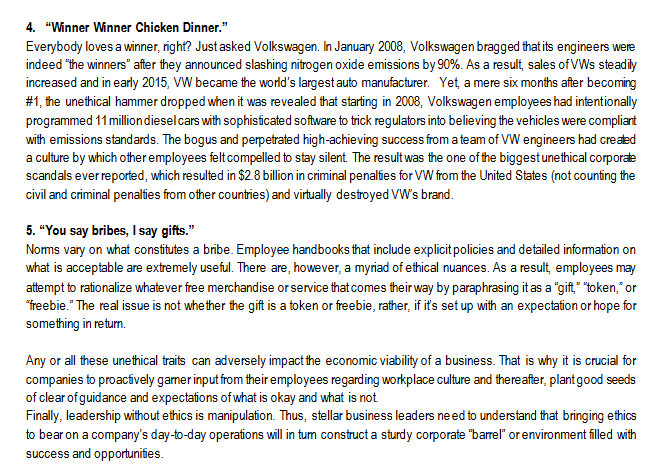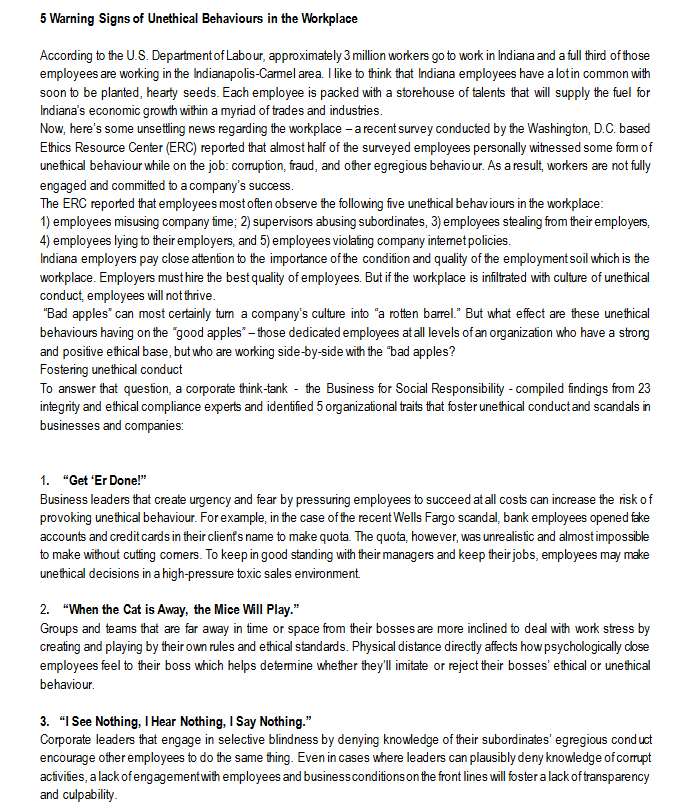QUESTION 1 Discuss the importance and purpose of good business ethics referring to the case study
QUESTION 1 Discuss the importance and purpose of good business ethics referring to the case study
Management, Loose-Leaf Version
13th Edition
ISBN:9781305969308
Author:Richard L. Daft
Publisher:Richard L. Daft
Chapter12: Managing Human Talent
Section: Chapter Questions
Problem 9DQ
Related questions
Question
QUESTION 1
Discuss the importance and purpose of good

Transcribed Image Text:4. "Winner Winner Chicken Dinner."
Everybody loves a winner, right? Just asked Volkswagen. In January 2008, Volkswagen bragged that its engineers were
indeed "the winners" after they announced slashing nitrogen oxide emissions by 90%. As a result, sales of VWs steadily
increased and in early 2015, VW became the world's largest auto manufacturer. Yet, a mere six months after becoming
#1, the unethical hammer dropped when it was revealed that starting in 2008, Volkswagen employees had intentionally
programmed 11 million diesel cars with sophisticated software to trick regulators into believing the vehicles were compliant
with emissions standards. The bogus and perpetrated high-achieving success from a team of VW engineers had created
a culture by which other employees felt compelled to stay silent. The result was the one of the biggest unethical corporate
scandals ever reported, which resulted in $2.8 billion in criminal penalties for VW from the United States (not counting the
civil and criminal penalties from other countries) and virtually destroyed VW's brand.
5. "You say bribes, I say gifts."
Norms vary on what constitutes a bribe. Employee handbooks that include explicit policies and detailed information on
what is acceptable are extremely useful. There are, however, a myriad of ethical nuances. As a result, employees may
attempt to rationalize whatever free merchandise or service that comes their way by paraphrasing it as a "gift," "token," or
"freebie." The real issue is not whether the gift is a token or freebie, rather, if it's set up with an expectation or hope for
something in return.
Any or all these unethical traits can adversely impact the economic viability of a business. That is why it is crucial for
companies to proactively garner input from their employees regarding workplace culture and thereafter, plant good seeds
of clear of guidance and expectations of what is okay and what is not.
Finally, leadership without ethics is manipulation. Thus, stellar business leaders need to understand that bringing ethics
to bear on a company's day-to-day operations will in tum construct a sturdy corporate "barrel" or environment filled with
success and opportunities.

Transcribed Image Text:5 Warning Signs of Unethical Behaviours in the Workplace
According to the U.S. Department of Labour, approximately 3 million workers go to work in Indiana and a full third of those
employees are working in the Indianapolis-Carmel area. I like to think that Indiana employees have a lot in common with
soon to be planted, hearty seeds. Each employee is packed with a storehouse of talents that will supply the fuel for
Indiana's economic growth within a myriad of trades and industries.
Now, here's some unsettling news regarding the workplace - a recent survey conducted by the Washington, D.C. based
Ethics Resource Center (ERC) reported that almost half of the surveyed employees personally witnessed some form of
unethical behaviour while on the job: corruption, fraud, and other egregious behaviour. As a result, workers are not fully
engaged and committed to a company's success.
The ERC reported that employees most often observe the following five unethical behaviours in the workplace:
1) employees misusing company time; 2) supervisors abusing subordinates, 3) employees stealing from their employers,
4) employees lying to their employers, and 5) employees violating company internet policies.
Indiana employers pay close attention to the importance of the condition and quality of the employment soil which is the
workplace. Employers must hire the best quality of employees. But if the workplace is infiltrated with culture of unethical
conduct, employees will not thrive.
"Bad apples" can most certainly turn a company's culture into "a rotten barrel." But what effect are these unethical
behaviours having on the "good apples" - those dedicated employees at all levels of an organization who have a strong
and positive ethical base, but who are working side-by-side with the "bad apples?
Fostering unethical conduct
To answer that question, a corporate think-tank- the Business for Social Responsibility - compiled findings from 23
integrity and ethical compliance experts and identified 5 organizational traits that foster unethical conduct and scandals in
businesses and companies:
1. "Get 'Er Done!"
Business leaders that create urgency and fear by pressuring employees to succeed at all costs can increase the risk of
provoking unethical behaviour. For example, in the case of the recent Wells Fargo scandal, bank employees opened fake
accounts and credit cards in their client's name to make quota. The quota, however, was unrealistic and almost impossible
to make without cutting comers. To keep in good standing with their managers and keep their jobs, employees may make
unethical decisions in a high-pressure toxic sales environment.
2. "When the Cat is Away, the Mice Will Play."
Groups and teams that are far away in time or space from their bosses are more inclined to deal with work stress by
creating and playing by their own rules and ethical standards. Physical distance directly affects how psychologically close
employees feel to their boss which helps determine whether they'll imitate or reject their bosses' ethical or unethical
behaviour.
3. "I See Nothing, I Hear Nothing, I Say Nothing."
Corporate leaders that engage in selective blindness by denying knowledge of their subordinates' egregious conduct
encourage other employees to do the same thing. Even in cases where leaders can plausibly deny knowledge of corrupt
activities, a lack of engagement with employees and business conditions on the front lines will foster a lack of transparency
and culpability.
Expert Solution
This question has been solved!
Explore an expertly crafted, step-by-step solution for a thorough understanding of key concepts.
Step by step
Solved in 3 steps

Recommended textbooks for you

Management, Loose-Leaf Version
Management
ISBN:
9781305969308
Author:
Richard L. Daft
Publisher:
South-Western College Pub

Management, Loose-Leaf Version
Management
ISBN:
9781305969308
Author:
Richard L. Daft
Publisher:
South-Western College Pub